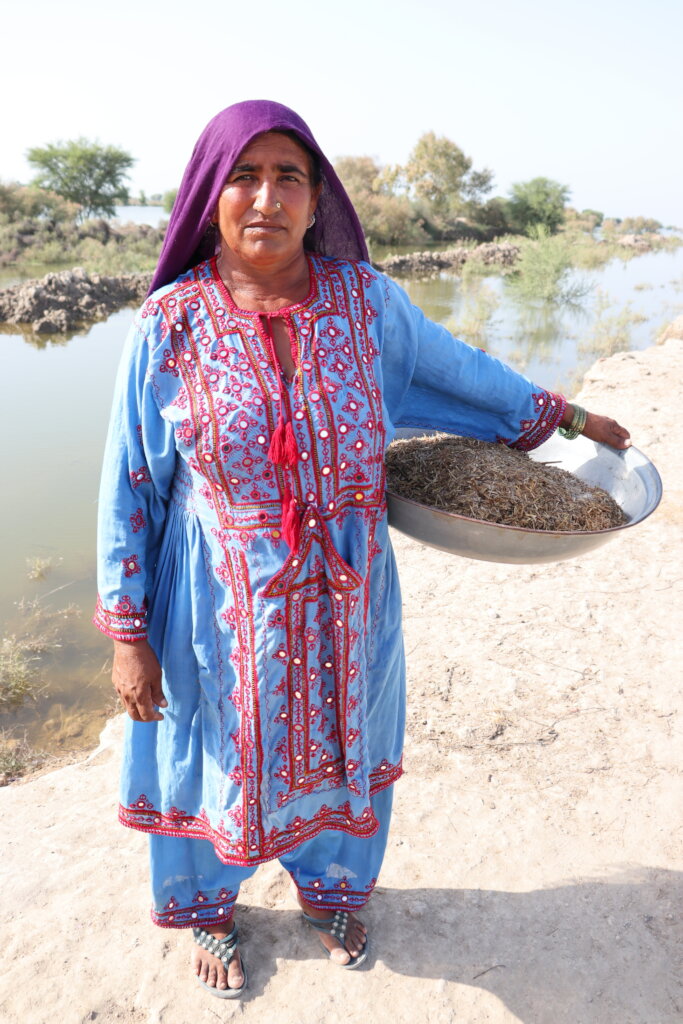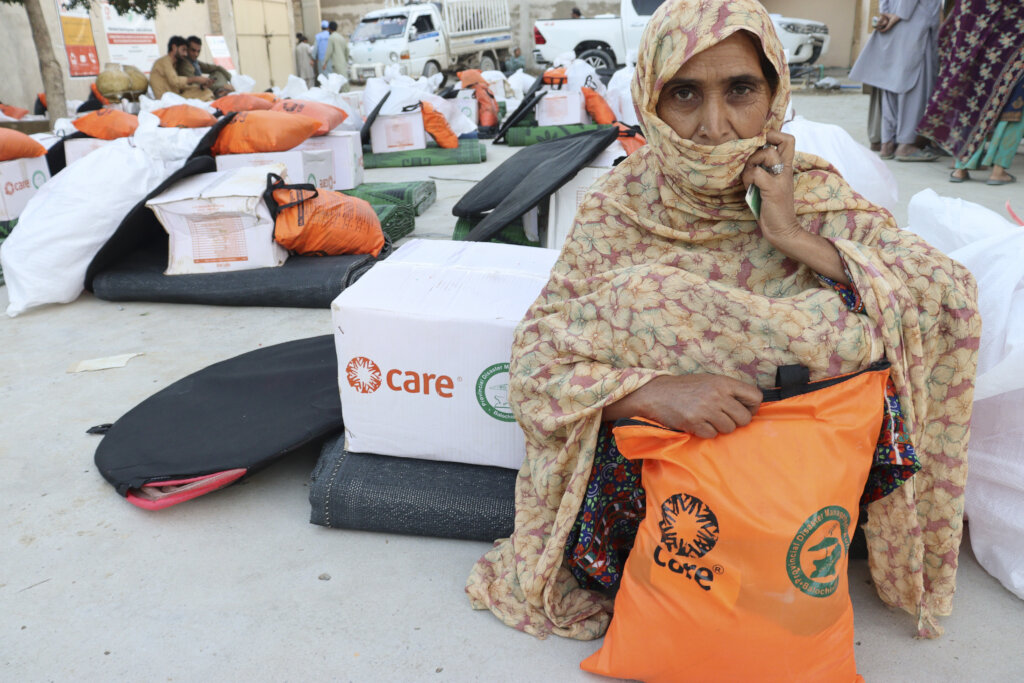By CARE's Writing Team | CARE
Communities rebuild after the deluge
Introduction
Last summer, severe flooding across Pakistan impacted an estimated 33 million people, causing three million people to flee from their homes. The monsoon rains dropped 726% of the average rainfall on certain places. Approximately 1,700 people died as a result of the flooding, and 2.2 million homes were damaged or destroyed. More than 99% of affected communities are located in Balochistan, Khyber Pakhtunkhwa (KP), Punjab and Sindh provinces. Heavy rains damaged thousands of miles of roads, hundreds of bridges and submerged railway tracks, disrupting delivery of essential goods along vital routes. Nearly 3.6 million acres of agricultural lands were under water, impacting an estimated 4.3 million people who relied on agriculture for their livelihood.
Six months later, 1.3 million people are still living near contaminated, stagnant flood water. UNICEF estimates that 20.6 million people are in need of humanitarian assistance, including 9.6 million children. More than 10 million people still lack access to safe drinking water. Cases of mosquito-borne diseases, like malaria, have increased dramatically, and communities face the constant risk of deadly waterborne diseases, like cholera, after water, sanitation and hygiene (WASH) infrastructure was literally washed away. In rural areas, prices for basic goods have skyrocketed. In some areas, inflation has increased by 45% compared to before the flooding, making basic necessities prohibitively expensive for many.
Humanitarian Response
CARE was quick to respond, providing critical supplies to vulnerable families within days of the flooding. CARE worked with local implementing partners, including Bright Star Development Society of Balochistan (BSDSB) and the Taraqee Foundation, to launch a two-phased response to meet the needs of flood-affected families in Balochistan province. CARE conducted a rapid needs assessment in collaboration with the Balochistan Provincial Disaster Management Authority (PDMA), a multi-sectoral rapid needs assessment in Punjab and Sindh provinces, and a rapid gender analysis in the city of Quetta to inform our humanitarian response strategy.
In the first six months, CARE has reached 58,310 people across Balochistan, Punjab and Sindh provinces. CARE provided emergency shelter materials to 4,190 people and built 50 emergency latrines to ensure a healthy and sanitary environment in camps for internally displaced people (IDPs). Our teams also distributed 1,390 jerry cans to store water and 8,930 hygiene kits to enable families to live with dignity. CARE also distributed 3,310 food baskets and 5,190 non-food items to families that had lost everything to the floods.
Following this initial response phase, CARE will support the recovery of flood-affected communities, helping families rebuild what they have lost. CARE will assist with rehabilitating or constructing permanent shelters, water systems and household latrines that were damaged or destroyed by flooding. We will also work with local partners to rebuild important community structures, like schools and health facilities. To help farmers restore their livelihoods and ensure the availability of nutritious food for the rest of the community, CARE will also provide agricultural inputs, like seeds, tools and poultry kits. Finally, the provision of cash transfers will empower families to make their own decisions about what they need most: food, construction materials or medicines. As with all of CARE’s humanitarian response efforts, we will ensure that all of our project activities meet international standards, including Sphere standards and cluster-level recommendations for each sector. We will also establish and maintain a community feedback mechanism throughout the course of the response and take safeguarding steps to ensure that community members feel safe and empowered to share complaints and feedback about project activities.
Funding Target
There are still many unmet needs, both now and in the difficult months to come. CARE seeks to raise $50 million to expand our response and recovery efforts in order to reach 12,312,850 people over the next three years. To date, we have raised more than $1.5 million, which helped us to provide temporary shelter and basic necessities for families displaced by the flooding, however these communities are still in need of humanitarian assistance. As families begin the arduous process of rebuilding their homes and livelihoods, CARE will be there. Your continued support will enable our teams in Pakistan to reach more families and help them build back stronger.
Conclusion
As the country is still struggling to recover from the economic and health impacts of the COVID-19 pandemic, many safety nets have already been stretched to their limits. The scale of the destruction caused by these floods cannot be overstated. With your support, CARE can provide lifesaving assistance during these uncertain and dangerous times. Previous support for the Pakistan Flood Response[1] fund helped us to provide shelter, food and other essential items to families in their time of need, and your continued support can help displaced families like Ashiq’s to rebuild what they have lost. On behalf of the people who stand to benefit from this response, CARE thanks you for your generosity.
[1] To effectively manage the current emergency response and continue to be able to deploy resources for other emergencies, CARE will reserve 20% of donations to the Pakistan Flood Response to cover technical support, administration and emergency preparedness expenses, including the rapid deployment of staff to emergencies such as this one.
Links:
By CARE's Emergency Response Team | CARE's Writing Team
Project reports on GlobalGiving are posted directly to globalgiving.org by Project Leaders as they are completed, generally every 3-4 months. To protect the integrity of these documents, GlobalGiving does not alter them; therefore you may find some language or formatting issues.
If you donate to this project or have donated to this project, you can recieve an email when this project posts a report. You can also subscribe for reports without donating.

